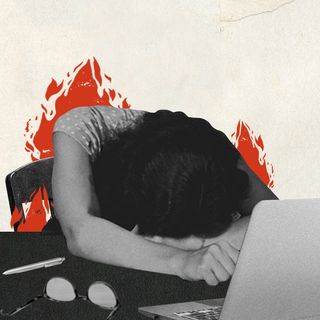Working for more than 55 hours a week can have serious repercussions on our physical health, which has killed as many as 7,45,000 people in 2016 alone, according to a new study.
Published in Environment International on Monday, the report was prepared by the World Health Organization (WHO) and the International Labor Organization (ILO). According to the study, working for more than 55 hours per week increased the risk of stroke by 35% and that of death due to heart diseases by 17% — in comparison to working up to 40 hours a week.
While the international team of researchers behind the report analyzed data between 2000-2016, the study suggests the ongoing economic crisis prompted by the pandemic will only exacerbate the trend — especially since “past experience has shown that working hours increased after previous economic recessions.”
Moreover, the shift in work cultures across the world due to pandemic protocols stands to further heighten the risk, especially due to work hours blurring with personal time during remote working — skewing people’s work-life balance. “Teleworking has become the norm in many industries, often blurring the boundaries between home and work. In addition, many businesses have been forced to scale back or shut down operations to save money, and people who are still on the payroll end up working longer hours,” Dr. Tedros Adhanom Ghebreyesus, Director-General of the WHO, said in a statement.
“No job is worth the risk of stroke or heart disease,” he added.
Related on The Swaddle:
Why Second‑Wave WFH Burnout Feels So Different From Regular Work Stress
Since last March 2020, remote working has introduced a new reality for most people: that of relentless video calls, being glued to screens, and constantly plugged into work. The consequences are increasingly felt in the form of “Zoom fatigue,” exhaustion, and burnout. “Working from home has diluted the work-and-home boundary. People [are] working at odd hours, with no clear breaks in between…” Ankita Jain, a psychologist from Hyderabad, had told The Swaddle last September, adding that “under lockdown, there’s no break from the grind, and our mind doesn’t really get to recover on the weekends.”
While work-from-home burnout is impacting people across the globe, the mental and emotional toll it takes on people is particularly pointed in India. Past reports show how Indians are clock in some of the longest hours across the globe — with estimates ranging from 48 hours to 54 hours per week — and the actual figures could be much worse. “Today, the eight-hour work-day remains elusive,” Rajni Bakshi, an international journalist, wrote in Firstpost two years ago, adding that “…work[ing] 12 hours a day and 6 days a week… is what millions of Indians, in different walks of life, regard as ‘normal.'”
In fact, amid the Covid19 pandemic, one in every three Indian professionals was dealing with workplace burnout, according to reports. With India preparing for yet another wave, remote-working is here to stay for the near future; some companies are also planning for long-term remote working models. The need for intervention is urgent to ensure people aren’t caught in this perpetual cycle of exhaustion and burnout.
To effect change, collective action is required. “It’s time that we all, governments, employers, and employees wake up to the fact that long working hours can lead to premature death…” Dr. Maria Neira, director of the Department of Environment, Climate Change, and Health, at the WHO, said in a statement. “Working 55 hours or more per week is a serious health hazard.”




